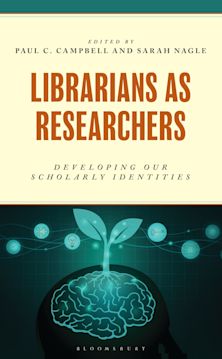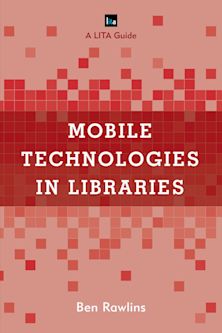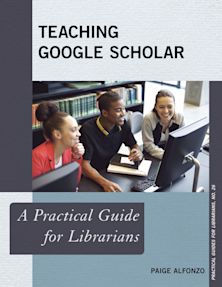- Home
- ACADEMIC
- Library & Information Science
- Research Methods
- Successful Strategies for Teaching Undergraduate Research
Successful Strategies for Teaching Undergraduate Research
Successful Strategies for Teaching Undergraduate Research
This product is usually dispatched within 3 days
- Delivery and returns info
-
Free US delivery on orders $35 or over
You must sign in to add this item to your wishlist. Please sign in or create an account
Description
Editors Marta Deyrup and Beth Bloom have brought together well-known educators from the fields of library science, communication, composition, and education to show you how to develop successful strategies for teaching undergraduates how to conduct basic research and write papers. Chapters cover each step of the research process, beginning appropriately with separate pieces from a librarian and from an academic on how to construct good research assignments. Following chapters cover establishing the research question, assessing the research process, information ethics and the protocols of research, and using new modes and media to communicate research findings. The book fully explores current theories on pedagogy and provides practical demonstrations of how library instruction can reinforce critical thinking and set the groundwork in place for life-long learning. Each chapter contains an extensive bibliography for further reading.
Table of Contents
Part I: The State of Teaching Today
Chapter 1.Undergraduates and Library Research: What's Changed, What Hasn’t, What Now? Mary George
Chapter 2.Research Questions and the Research Question: What Are We Teaching When We Teach Research? Heidi M. Jacobs
Chapter 3.Understanding the Relationship between Good Research and Good Writing Barbara D’Angelo
Chapter 4.Toward the "Good" Research Assignment--A Librarian Speaks Roberta Tipton
Chapter 5.Toward the “Good” Research Assignment – An Academic Speaks WilliamJames Hoffer
Chapter 6.Teaching New Media as a Form of Writing: Explorations in Evolving Genres James Elmborg
Chapter 7.From Punitive Policing to Proactive Prevention: Approaches to Teaching Information Ethics in the College Classroom Maria Accardi
Chapter 8.Assessing the Information Research Process Stephanie Brasley
Part II: The Strategies in Action: Four Ideas that Work
Chapter 9.Before Search: A Scaffolded Approach to Teaching Research Stephanie Otis
Chapter 10.Raids for Research Sara Miller
Chapter 11.College Students as Wikipedia Editors: New pathways to Information Literacy Sharf
Chapter 12.Training the Trainer: Librarians as Faculty Coaches and Workshop Designers Bloom
About the Editors and Contributors
Index
Product details
| Published | Sep 11 2013 |
|---|---|
| Format | Paperback |
| Edition | 1st |
| Extent | 204 |
| ISBN | 9780810887169 |
| Imprint | Scarecrow Press |
| Illustrations | 2 BW Illustrations, 4 Tables |
| Dimensions | 9 x 6 inches |
| Publisher | Bloomsbury Publishing |
About the contributors
Reviews
-
Editors Deyrup and Bloom (catalog coordinator and information literacy coordinator, respectively, Seton Hall Univ. Libs.) have assembled a rich group of contributors to provide a variety of perspectives on the subject of how to teach undergraduates some basic research strategies. There are pieces here by undergraduate faculty and by academic librarians, e.g., "Toward the 'Good' Research Assignment: An Academic Speaks," by Williamjames H. Hoffer in Seton Hall University's department of history, and "Toward the 'Good' Research Assignment: A Librarian Speaks," by Roberta Tipton, business and information literacy librarian at Rutgers University. Of particular interest are entries highlighting the dynamic ways in which technology is being incorporated into the student information-seeking process. For example, there are extensive descriptions of successful programs helping students become approved Wikipedia editors so as to gain research and online publishing experience. Chapters related to evaluation, developing effective relationships with faculty, and classroom activities round out the offerings. The notes section ending each entry will guide librarians who wish to explore each topic further. VERDICT A helpful work both for those new to research instruction and those looking to revitalize their approaches to engaging students.
Library Journal
-
Co-edited by the Catalog Coordinator and the Information Literacy Coordinator at Seton Hall University Libraries, this work offers 11 chapters organized in 2 sections. Seven chapters focus on the state of teaching today, with an emphasis on teaching research skills and methodologies, whether as a separate research class or as part of a subject or content course. This first part addresses research questions, the relationship between good research and good writing, what is a 'good' research assignment as determined by a librarian and by an academic, new media as a form of writing, information ethics, and more. The final four chapters offer four ideas that work, presenting strategies that have worked in case study format: scaffolding, RAIDS, Wikipedia editing, and training. This unique volume offers a focus on the research question itself, rather than information literacy as a whole, or research as separate from the library. This focus on information literacy as related to research, specifically at the undergraduate level is something that is of great importance but can be hard to find, and the way it is covered enables librarians in high schools and working with graduate students to also benefit from the information provided in the volume to successfully teach students and others about how to perform research, starting with the base of a strong research question.
American Reference Books Annual
-
Each of the papers making up this book includes an extensive bibliography of print and online resources, making it a useful reference for lecturers, librarians, information managers and everyone associated with guiding student research. It aids in creating an environment within which all parties can develop research questions that increasingly challenge students to respond to problems relating to the world and to themselves within this world. This is highly recommended as a reference or a text.
Australian Library Journal
-
The authors of this book, Marta Deyrup and Beth Bloom, are college librarians. Who else could be an expert at dealing with research? . . .The authors cover research with media, archives, texts, and any other source that the average college student will need. . . .We can blame the internet for students’ weaknesses today but blame alone will not cure the problem. Research may have to be taught to the student, and that is where this book comes in.
Olive Branch United
-
Deyrup and Bloom contribute a valuable addition to the information literacy instruction literature with this book packed with thoughtful reflection, wise advise and tested strategies from experts actively involved in undergraduate research for a writing assignment. Highly recommended for librarians, teachers and professors engaged in the demanding process of guiding student inquiry.
Carol Collier Kuhlthau, Professor Emerita, Rutgers University


































